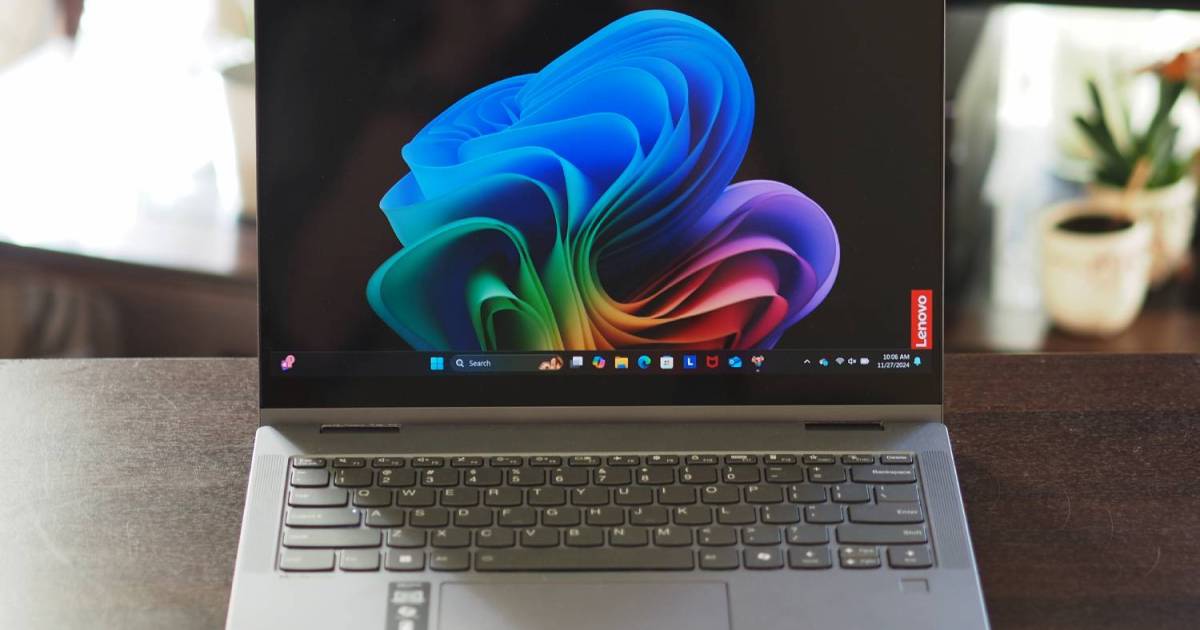Lenovo IdeaPad 5x 2-in-1
MSRP $850.00
“The Lenovo IdeaPad 5x 2-in-1 has an OLED display mated with great battery life.”
Pros
- Good performance
- Great battery life
- Colorful OLED display
- Build quality is solid
- Attractive price
Cons
- Not the sharpest display
- Mediocre touchpad
When Microsoft introduced its Copilot+ PC initiative, Qualcomm’s Snapdragon X chipsets were the first to receive Microsoft’s official blessing. They’ve so far proven to be very fast and efficient and give Windows laptops a boost against Apple’s MacBooks. They’re also a bit less expensive than Intel machines, a side benefit that shouldn’t be ignored.
The Lenovo IdeaPad 5x 2-in-1 is a good example. It’s still a midrange machine coming in between $850 and $1,000, so it’s not inexpensive. But you’ll pay a few hundred dollars more for Intel, in many cases. And the IdeaPad 5x is an attractive laptop in some important areas, not the least of which is in its performance and battery life. It might not make our list of the overall best laptops, but it has a number of strong points that make it worth considering, especially for laptops under $1,000.
Specs and configuration
| Lenovo IdeaPad 5x 2-in-1 | |
| Dimensions | 12.32 x 8.94 x 0.69 inches |
| Weight | 3.28 pounds |
| Display | 14.0-inch 16:10 FHD+ (1920 x 1200) OLED, 60Hz |
| CPU | Snapdragon X Plus X1P-42-100 |
| GPU | Adreno |
| Memory | 16GB LPDDR5X RAM |
| Storage | 512TB M.2 NVMe SSD 1TB M.2 NVMe SSD |
| Ports | 2 x USB-C 3.2 Gen 2 2 x USB-A 3.2 Gen 1 1 x HDMI 2.1 1 x microSD card reader 1 x 3.5mm audio jack |
| Camera | 1080p |
| Wireless | Wi-Fi 7 and Bluetooth 5.3 |
| Battery | 57 watt-hour |
| Operating system | Windows 11 on Arm |
| Price | $850+ |
As with many of the early Qualcomm laptops, there aren’t a bunch of configuration options with the IdeaPad 5x 2-in-1. The entry-level model is $850 for a Qualcomm Snapdragon X Plus chipset, 16GB of RAM, a 512GB SSD, and a 14-inch FHD+ OLED display (the only option). For $895, you can upgrade to a 1TB SSD. An active pen is a $20 option.
When Lenovo originally offered the laptop for review, it was priced at $679. That would be a very attractive price for this laptop, and Lenovo says a sale price like that might show up around the holidays. A list price of $850 is attractive enough, though, when some other Qualcomm laptops list for more.
An example is the HP OmniBook X at $1,090 with a 14-inch IPS display but a faster Snapdragon X Elite chipset. That machine is currently on sale for $780, though. The Lenovo Yoga Slim 7x starts at $1,080 with OLED and a Snapdragon X Elite. Then there are Intel Lunar Lake laptops to consider, such as the HP OmniBook Ultra Flip 14 that lists for $1,450 with a higher-res 2.8K OLED display and an Intel Core Ultra 5 226V that’s on sale for $1,000.
The bottom line is that the IdeaPad 5x 2-in-1 is a good value even at full price, and if you manage to grab one on sale, you’re getting a pretty good bargain.
Design

It’s rare that I come across a poorly built laptop lately. Granted, I’ve been reviewing mostly midrange or premium laptops where you expect decent builds, but it wasn’t that long ago when even laptops close to $1,000 could suffer some poor quality. The IdeaPad 5x 2-in-1 is constructed of a mix of aluminum and plastic, but it didn’t have any bending, flexing, or twisting in the lid, keyboard deck, or chassis.
It certainly didn’t feel like a laptop partially made of plastic, and I wouldn’t say the more expensive OmniBook Ultra Flip 14 — an extremely well-made laptop — was all that noticeably better. The MacBook Air 13, which nobody would call poorly made, has a lid that’s more flexible.

There was also a time when a laptop that was 0.69 inches thick would have been considered very thin. Today, that’s getting into the chunky range, but it’s certainly nothing to complain about. The top and side bezels are small enough, but the bottom chin is pretty big, which isn’t uncommon for 2-in-1s that need a hinge that can switch from clamshell to media, tent, and tablet modes.
It’s a small enough laptop and it’s fairly light at 3.28 pounds — again, perfectly fine if not a class leader. Interestingly, Acer has borrowed the reverse notch housing the webcam and infrared camera from Lenovo, which compares to Apple’s display notch that’s a lot more divisive.
There’s not a lot to say about the IdeaPad 5x 2-in-1 in terms of its aesthetics. Many laptops have a certain look today — that is, they’re minimalist without any standout design features or bling. And that’s OK. For many people, a laptop isn’t a fashion statement, and while the HP OmniBook Ultra Flip 14 is notably better looking, who cares? The IdeaPad 5x looks just fine in its single dark gray color way, and unless you really want your laptop to stand out in the coffee shop, you likely won’t really care one way or another.
Keyboard and touchpad

The IdeaPad 5x has Lenovo’s standard keyboard with its easily-identified sculpted keycaps and good spacing. The switches vary from machine to machine, and these are light and springy. I like the keyboard, and it was comfortable when I typed up this review. I could quibble and say Apple’s Magic Keyboard is better, but this one’s very good nonetheless.
The touchpad is just OK, though. First, it’s not all that large, with plenty of space on the palm rest for a larger version. And it’s mechanical and not haptic, which is expected at this price. It’s serviceable, but doesn’t stand out compared to much better haptic touchpads on MacBooks and the HP OmniBook Ultra Flip 14.
The display is touch- and pen-enabled, of course, and my review unit included the active pen. It worked well for writing and drawing on the display, although as usual the 14-inch convertible 2-in-1 isn’t nearly as comfortable for such uses as a thin and light tablet like the iPad Pro.
Connectivity and webcam
There’s plenty of connectivity, including a good mix of legacy ports. The only problem is that there are no high-speed ports, which is a bit surprising. Other Qualcomm laptops have USB4, but there’s none of that here. There’s a microSD card reader, which is a plus. And wireless connectivity is fully up-to-date.
The webcam is a 1080p version, which is the new standard. It’s good enough to support the full range of the enhanced version of Microsoft Studio Effects software, and the neural processing unit (NPU) exceeds the 40 tera operations per second (TOPS) requirement Microsoft set for its Copilot+ PC initiative. That means the IdeaPad 5x will support the full range of AI features as they roll out with reasonably fast and efficient on-device performance.
Performance

The IdeaPad 5x 2-in-1 uses the slowest Qualcomm Snapdragon X chipset, the Snapdragon X Plus X1P-42-100. It’s an 8-core chipset running at 3.2GHz boosting to 3.4 GHz (single-core) and with a 1.7 TFLOPS Adreno GPU. That’s down from the 12-core Snapdragon X Elite running at 3.4GHz with a boost to 4.0GHz (dual-core) and with a 3.8 TFLOPS or faster GPU.
It’s up against the 8-core Intel Lunar Lake chipsets that represent Intel’s response to Qualcomm’s more efficient ARM-based chipsets. Of course, running on ARM requires Windows on ARM, which will run some software in emulation that will slow things down, and compatibility issues remain possible.
As we can see from our comparison group, the Qualcomm chipsets are faster than Intel’s across the board, while AMD’s Ryzen AI 9 chipset is faster still but not at all aimed at efficiency. The Snapdragon X Plus X1P-42-100 may be the slowest chipset in Qualcomm’s stable, but it’s still meaningfully faster than Intel — at least in CPU performance. Its Adreno GPU is considerably slower, though, even given some variation in the Intel Arc 140V integrated graphics. As we can see, even the entry-level discrete GPU in the Asus ProArt PX13 is a lot faster.
What this means is that the IdeaPad 5x is plenty fast for even demanding productivity users. It won’t make gamers or creators, who rely on fast GPUs, very happy. And also notably, the MacBook Air M3 is just as fast in its CPU cores while being a lot faster in its GPU cores. The MacBook Air won’t get the M4 chipset until next year, but that will give it another significant boost.
| Cinebench R24 (single/multi) |
Geekbench 6 (single/multi) |
3DMark Wild Life Extreme |
|
| Lenovo IdeaPad 5x 2-in-1 (Snapdragon X Plus X1P-42-100 / Adreno) |
108 / 663 | 2418 / 11453 | 3243 |
| Dell XPS 13 9350 (Core Ultra 7 256V / Intel Arc 140V) |
120 / 571 | 2575 / 10530 | 4840 |
| Dell XPS 13 9345 (Snapdragon X Elite X1E-80-100 / Adreno) |
121 / 921 | 2805 / 14511 | 6397 |
| HP OmniBook Ultra Flip 14 (Core Ultra 7 258V / Intel Arc 140V) |
116 / 598 | 2483 / 10725 | 5866 |
| Asus Zenbook S 14 (Core Ultra 7 258V / Intel Arc 140V) |
112 / 452 | 2738 / 10734 | N/A |
| HP OmniBook X (Snapdragon X Elite X1E-78-100 / Adreno) |
101 / 749 | 2377 / 13490 | 6165 |
| Asus ProArt PX13 (Ryzen AI 9 HX 370 / RTX 4050) |
116 / 897 | 2710 / 14696 | 15298 |
| MacBook Air (M3) |
141 / 601 | 3102 / 12078 | 8098 |
Battery life

Even though it’s fast, the Qualcomm’s primary purpose is to offer better efficiency in Windows laptops. That’s Intel’s objective with Lunar Lake, as well. And both platforms succeed, offering up very solid battery life especially when the chipsets aren’t working as hard. The IdeaPad 5x has an OLED display that’s also just FHD+ resolution, which gives it a little more efficiency but awesome quality (see below). The Dell XPS 13 9350 and XPS 13 9345 both had an FHD+ IPS display while the OmniBook Ultra Flip 14 had a 2.8K OLED panel.
The IdeaPad 5x will easily last a full day of normal work, and even into a second day. Prior to these new chipsets, only Apple Silicon laptops like the MacBook Air M3 could make the same kind of claim. Arguably, the MacBook Air has the longest battery life all around, but there’s no longer nearly as great a delta between Windows and macOS. We’ll have to wait until the M4 chipset hits the MacBook Air in 2025 to see if Apple extends its lead.
| Web browsing | Video | Cinebench R24 | |
| Lenovo IdeaPad 5x 2-in-1 (Snapdragon X Plus X1P-42-100) |
13 hours, 22 minutes | 20 hours, 36 minutes | 2 hours, 12 minutes |
| Dell XPS 13 9350 (Core Ultra 7 256V) |
13 hours, 33 minutes | 24 hours, 52 minutes | 2 hours, 24 minutes |
| Dell XPS 13 9345 (Snapdragon X1E-80-100) |
12 hours, 29 minutes | 22 hours, 9 minutes | 1 hour, 37 minutes |
| HP OmniBook Ultra Flip 14 (Core Ultra 7 258V) |
11 hours, 5 minutes | 15 hours, 46 minutes | 2 hours, 14 minutes |
| HP Omnibook X (Snapdragon X Elite X1E-78-100) |
13 hours, 37 minutes | 22 hours, 4 minutes | 1 hour, 52 minutes |
| Asus Vivobook S 15 (Snapdragon X Plus) |
13 hours, 10 minutes | 16 hours, 19 minutes | N/A |
| Asus ProArt PX13 (Ryzen AI 9 HX 370) |
8 hours, 7 minutes | 11 hours, 12 minutes | 1 hour, 12 minutes |
| Apple MacBook Air (Apple M3) |
19 hours, 38 minutes | 19 hours, 39 minutes | 3 hours, 27 minutes |
Display and audio

I love OLED displays. They just look so much better out of the box than IPS displays, even though that technology has gotten a lot better over the last several years. OLED’s colors are so much brighter and blacks are so much inkier, that even a 14.0-inch FHD+ (1920 x 1200) display that I’d usually dislike as not being sharp enough looks great. That’s what Lenovo put in the IdeaPad 5x 2-in-1, and it was a great choice.
My colorimeter liked the display. Colors were incredibly wide at 100% of sRGB, 98% of AdobeRGB, and 99% of DCI-P3, and accuracy was great at a Delta-E of 1.34 (less than 1.0 is excellent). Contrast was high at 25,920:1 with the usual near-perfect blacks, and the panel was more than bright enough at 381 nits. I’ve seen many brighter displays, including other OLED panels, but this is still more than bright enough for all but working outside under direct sunlight.
Again, I do like higher resolution than FHD+ with a 14-inch display, but I doubt that many people will complain. And a lower resolution helps offset OLED for better battery life, which I saw in the battery life results.
Audio is provided by four speakers: two upward-firing and two downward-firing. Sound was very clear, with crip mids and highs and zero distortion. The only problem was the system didn’t get very loud, and bass was pretty faint. It’s not the best nor the worst audio you’ll find on a 14-inch laptop, where Apple’s MacBook Pro 14 is the standout performer.
A solid laptop at an attractive price

At $850, the IdeaPad 5x 2-in-1 is a great laptop. It has a very good OLED display, so long as you’re OK with the resolution. It’s also quite fast and gets excellent battery life. It’s well-built with an aesthetic that’s kind of boring but certainly isn’t ugly.
I wish it had a haptic touchpad, and it doesn’t have a fast USB4 port. But the best thing is, it’s entirely possible that you’ll be able to grab the IdeaPad 5x at an even greater deal at under $700. At that price, the laptop becomes even more than just an easy recommendation.
Read the full article here
















